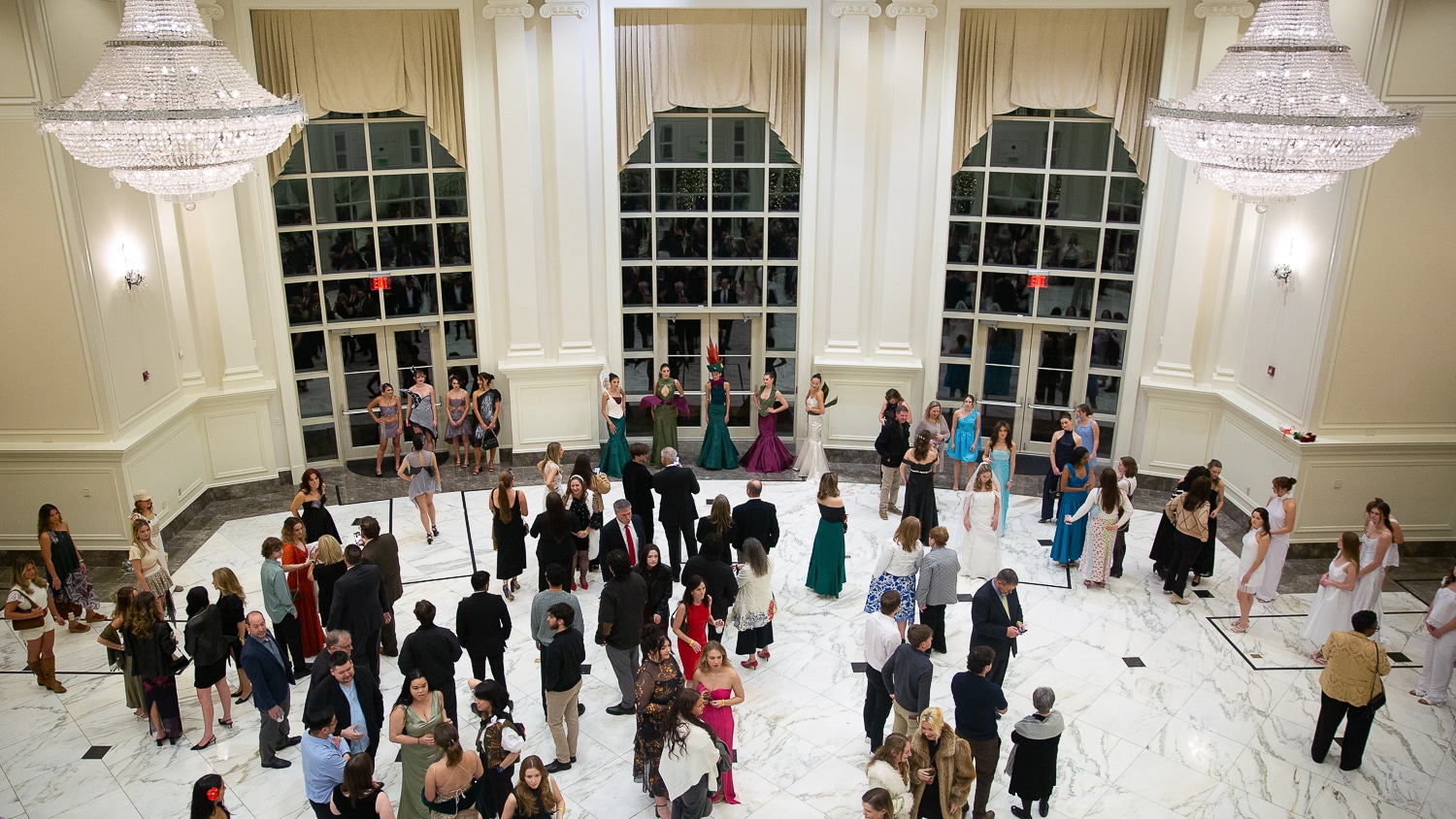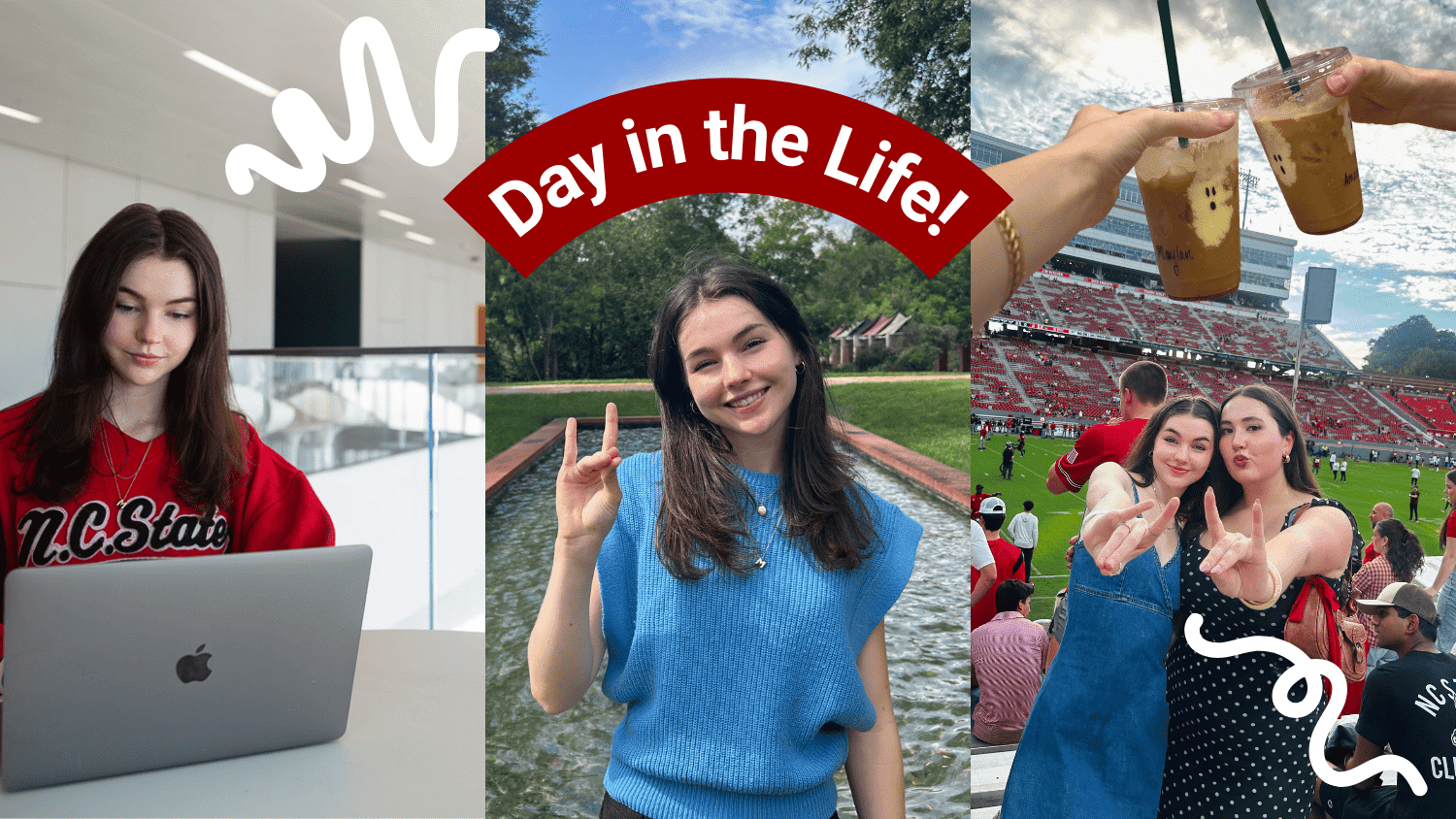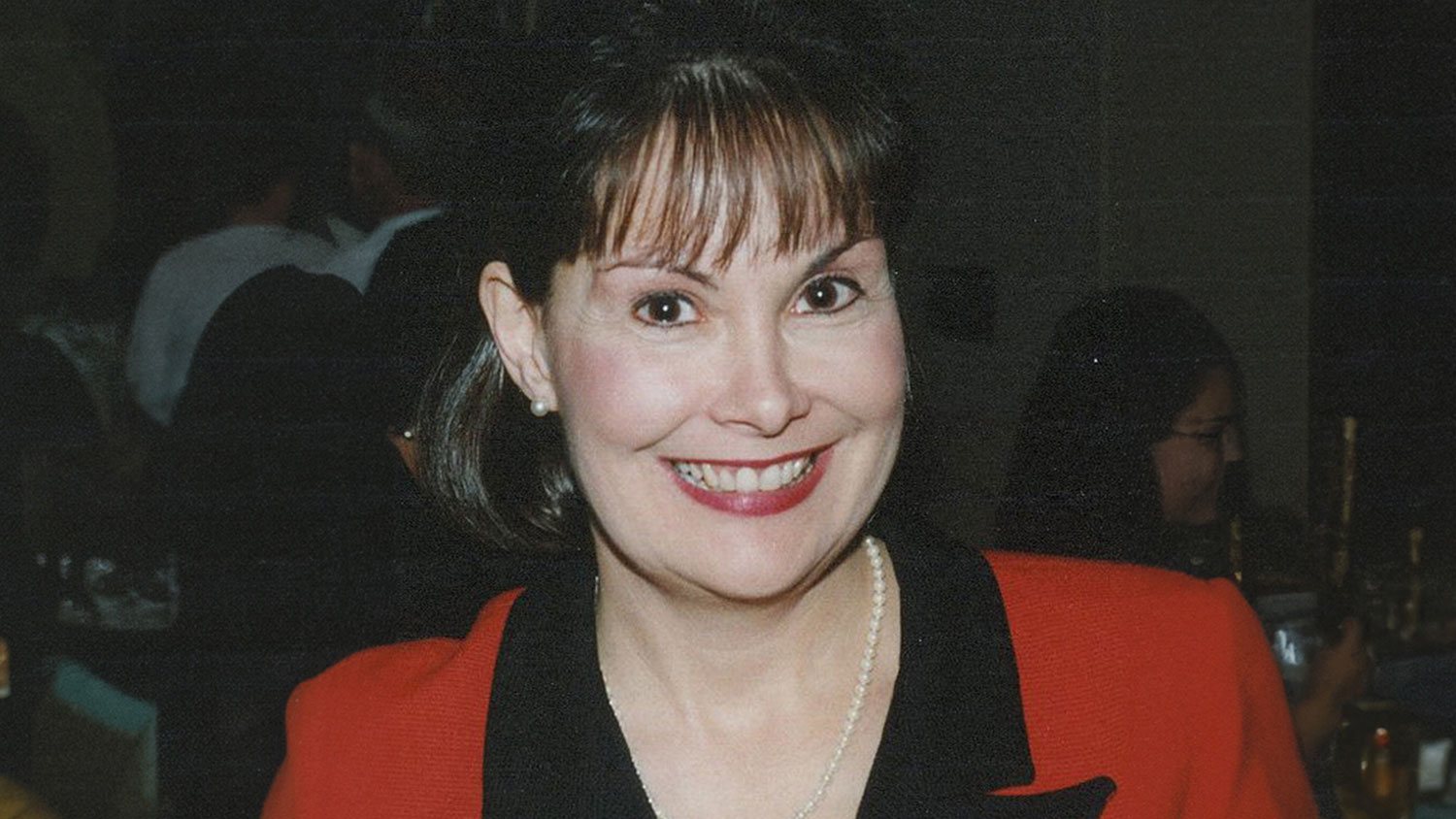Research Experience for Undergraduates Develops Confidence, Resumes

By Sarah Stone
Graduate student Meghan Lord walks into Duke Energy Hall at Hunt Library and eagerly scans the crowd. Soon, she spots the student she’s searching for and her face lights up. “Congratulations!” she tells him. “You did it!”
She’s speaking to Luis Martinez, who’s presenting about his contributions to their research on sustainable hydrophobic textile finishings at the university’s Undergraduate Research Symposium.
Martinez is just one of 29 Wilson College of Textiles students who traded a summer vacation for 10 weeks immersing themselves in the life of a graduate student through the Textile Engineering, Chemistry and Science (TECS) Research Experience for Undergraduates (REU). Students applied to the program and were matched with a lab based on their interests. They work hand in hand with Ph.D. students and faculty on existing projects.
This is the first summer that all TECS students could participate in the program. Previously, only textile engineering (TE) students had the opportunity for paid summer REUs due to enhancement fees they pay to the College of Engineering throughout the school year. That discrepancy in opportunity didn’t sit well with TECS Department Head Dr. Jeff Joines, so he set out to change it.
“I’ve been raising gift money to try to cover so that our polymer and color chemistry students and our textile technology students would have a similar opportunity,” Joines says. “Because for me it’s about giving opportunities of experience.”
These expanded opportunities came at the perfect time, as the pandemic continued to create roadblocks for those looking to gain hands-on experience. Many students say they had to change their summer plans in response to COVID-19.

“I’ve really been wanting to get into a lab since COVID. It’s really been just learning, just watching from afar,” senior polymer and color chemistry (PCC) student Shane Harrington says. “I really want to get hands-on experience because at the end of the day, learning from a book or a PowerPoint is one thing, but physically being there and doing it is going to be monumental when you’re going into a career.”
During their time in the lab, REU students made measurable progress in research ranging from cardiac stem cells to hydrophobic finishes made from sustainable processes to product development. That exposure taught them lessons about the research process that a classroom setting simply can’t offer, including:
- The role of background research.
“I didn’t realize how much literature you have to read, and I think as long as it takes me, I feel like I do learn just from reading the literature and being able to apply what I learned into the lab,” senior PCC student Luis Martinez says. - The importance of time management.
“Allocate more time than you think you need – always,” senior PCC student Molly Pruett says. “You realize pretty quickly when you refer to your Gantt chart that you were very idealistic about the way that the project was going to go at the beginning of the summer.” - How to keep a project organized.
“Make sure you write down everything you did so you don’t get to the end, and you’re like, ‘Where did this data come from? Why is that different?’” junior TE student Reid Barnett explains. - And how to roll with the punches.
“Learning in a classroom, it’s always a streamlined experiment. Usually you know it’s going to work out. And this, you don’t know if it’s going to work out,” Harrington says. “You have to work with the experiment and the understanding that it might not work out and that you have to find a viable solution to what went wrong, and sometimes there’s not a right answer.”
Working in a professional research lab day in and day out also means becoming familiar with the skills, procedures and processes that apply to graduate school or an industry setting. Ultimately, this familiarity translates to confidence. That’s true for Luis Martinez, who credits his REU with solidifying his desire to earn a Ph.D.
“Just working in the lab, getting more comfortable with my skills,” Martinez says. “Just knowing that every day I come in and I run the epoxidation, I feel like I’ve gotten more efficient with my time and being able to use lab equipment.”
The REU provided students with knowledge about not only conducting research in graduate school, but also what it means to be a graduate student. Working closely with graduate students allowed undergraduates to envision what the experience would really look like for them rather than relying only on information available from a tour or website.

“[Graduate student Caitlin Knowles] has been absolutely awesome at helping me understand the transition process into grad school. I’m gaining a lot of connections and knowledge about a process that I previously had no knowledge of before,” senior PCC student Molly Pruett says. “I’ve kind of shifted my path from, ‘I’m not going to go to grad school.’ to ‘I’m going to go to grad school, and actually, textiles is a really good place for me to go to grad school.’”
These candid conversations about graduate school represent a win for Joines and NEXT Fusion Designer Amanda Mills, who want to help students realize that earning a Ph.D. is both accessible and financially attainable.
“Don’t get me wrong, you still need good grades. You need a 3.0 GPA and you need to show that you’re dedicated, but really grad school and research isn’t about how smart you are. That’s so not even a factor,” Dr. Mills emphasizes. “It’s not about your talents. It’s really about, ‘Are you curious and are you persistent?’”

When it comes to paying for graduate school, Joines says students sometimes aren’t aware that tuition can be largely paid for through grants, scholarships and other sources of funding.
In another effort to make graduate school accessible to students from all economic backgrounds, Joines eliminated financial barriers from the department’s REU. He says students who have to work to support their education simply don’t have time to add research to their schedules during the school year, and many research opportunities offered during the summer don’t pay. Every student in this research program earned $15 per hour for their work.
With an increased student base secured, Joines asked Mills to help him run the REU program.
“I challenged her to provide professional development and diversity and help students to think about going to grad school,” Joines says.
Mills faced that challenge head on, scheduling community events and workshops that taught students how to prepare for job interviews, spruce up their resumes and identify unconscious bias in research.
An impactful internship with Argonne National Laboratory near Chicago inspired Mills’ approach.
“I really drew on that. I thought about, ‘Alright, well what did I learn there?’” Mills says. “I was always kind of a workshop nerd. I liked going to workshops, if not just for a break in my day but also for that additional skill building. So I really wanted to kind of take what we did there, and really kind of hone it.”
She says she’s noticing the effect this programming has on students.
“I have really enjoyed seeing some of their independence grow. You know, it’s so scary, and this is true of any new job, when you first get there. You’re kind of timid. You’re like, ‘Alright, I don’t want to break anything. Can someone help show me what to do?’” Mills says. “So now, it’s really cool to see the students take a little bit more ownership of their work.”
Students can take what they’ve accomplished during these 10 weeks far beyond this summer. Their work often results in published papers or continued research in the fall semester.
Help Provide Opportunities for Students
Grants and the generosity of faculty made this summer’s expanded TECS REU program at Wilson College possible. Additional funding will be necessary in order for this level of programming to return next year. If you want to contribute to the valuable experiential learning of the next generation of textile industry leaders, please donate to the TECS Enhancement Fund.
Unconscious Bias in Research
In addition to a number of workshops on professional development, students also had the opportunity for personal development. Wilson’s Associate Director of Student Services Delisha Hinton led the session, which a number of students listed as one of the most impactful parts of REU.
“[The workshop] made me kind of see things from a different perspective,” Martinez says.
Hinton helped students understand the definition of unconscious bias, shared examples of its impacts on artificial intelligence and the medical field, and challenged the audience to reflect on ways that such bias could be sneaking into their own work.
“I would say unconscious bias and research is becoming a little bit more of a popular topic, because there’s been this unearthing of thinking of ‘Okay, within medicine or within the medical field, it’s not applicable to all people. Historically, it has been for primarily white males, and so that doesn’t fit for the majority of the population,’ Hinton explains. “And so how do you start changing that?”
She hopes what students learned during their time with her will leave an impression on their time as a student and on into their careers.
- Categories:


